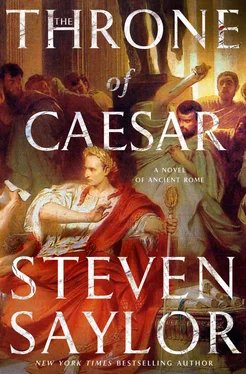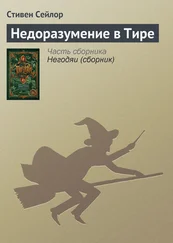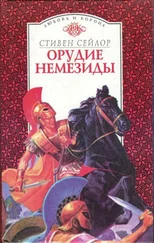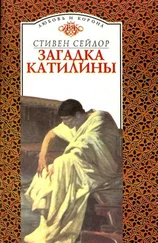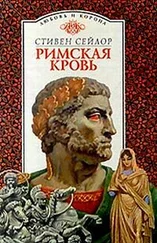Стивен Сейлор - The Throne of Caesar
Здесь есть возможность читать онлайн «Стивен Сейлор - The Throne of Caesar» весь текст электронной книги совершенно бесплатно (целиком полную версию без сокращений). В некоторых случаях можно слушать аудио, скачать через торрент в формате fb2 и присутствует краткое содержание. Год выпуска: 2018, Издательство: St. Martin's Press, Жанр: Исторический детектив, на английском языке. Описание произведения, (предисловие) а так же отзывы посетителей доступны на портале библиотеки ЛибКат.
- Название:The Throne of Caesar
- Автор:
- Издательство:St. Martin's Press
- Жанр:
- Год:2018
- ISBN:нет данных
- Рейтинг книги:5 / 5. Голосов: 1
-
Избранное:Добавить в избранное
- Отзывы:
-
Ваша оценка:
- 100
- 1
- 2
- 3
- 4
- 5
The Throne of Caesar: краткое содержание, описание и аннотация
Предлагаем к чтению аннотацию, описание, краткое содержание или предисловие (зависит от того, что написал сам автор книги «The Throne of Caesar»). Если вы не нашли необходимую информацию о книге — напишите в комментариях, мы постараемся отыскать её.
The Throne of Caesar — читать онлайн бесплатно полную книгу (весь текст) целиком
Ниже представлен текст книги, разбитый по страницам. Система сохранения места последней прочитанной страницы, позволяет с удобством читать онлайн бесплатно книгу «The Throne of Caesar», без необходимости каждый раз заново искать на чём Вы остановились. Поставьте закладку, и сможете в любой момент перейти на страницу, на которой закончили чтение.
Интервал:
Закладка:
“If Fulvia wanted us to be there—if she needed us to play some part among the mourners, or perform some other function—she would have asked us. No, Mother, it’s altogether proper that Papa should go, and take Davus with him, and that we should stay at home, so that neither of them has to worry about us. They’ll tell us all about the funeral when they come home, safe and sound. Won’t you, Papa? And you, too, Davus?” she added, as her husband entered the room, turning a bit sideways to fit though the doorframe.
Davus embraced his wife, and I did the same. Again the thought struck me: In at least one household in Rome, true harmony reigns. What a lucky man I was.
* * *
The funeral procession would begin at the Regia, whence Caesar’s body would be taken to the Forum, where Antony would deliver the eulogy from a platform on which a gilded shrine had been erected to hold the body. This shrine was shaped like the new Temple of Venus, which had been built and dedicated by Caesar for the worship of his ancestress. After the speech, the body would be removed from the shrine and the procession would continue to the Field of Mars, where a pyre had been erected for the cremation in an open area large enough to accommodate tens of thousands of mourners.
As Cinna and I proceeded down the slope of the Palatine toward the Regia, with Cinna’s bodyguard before us and Davus behind us, I could see that a vast crowd had already assembled in the Forum, thronging every step of the Sacred Way. They were dressed in various shades of brown and gray, but mostly in black.
“From a distance,” said Cinna “they look not unlike a huge flock of ravens, don’t you think? Black birds … filling the Forum…” He hummed and nodded vigorously. “Oh, yes, that’s good. Quite good. A vast flock of ravens to attend the funeral … of an eagle! Or something like that…”
“Cinna, what are you going on about?”
He looked a bit chagrined. “Did I not tell you? No, I haven’t seen you at all these last few days, have I? So much going on. But there’s a reason, you see, that I really must attend the funeral, must see it with my own eyes. What did Naevius say? ‘The poet must be a witness first.’”
“What are you talking about?”
“Do you remember what that beast Cimber yelled at me, as you and I were leaving the Senate House of Pompey?”
“Something like … ‘Write a poem about this !’”
“That’s right. He wasn’t serious, of course. He was mocking me. But later, I thought: Why not? Indeed, how can I have witnessed such a thing and not write about it?”
“You mean…”
“Exactly! Now that the Orpheus and Pentheus is finished … and Caesar’s Parthian campaign will never come about … what subject might I turn to next? I said to myself: Why write of gods and heroes of long ago, when I witnessed the death of the greatest man since Alexander—a living god, struck down before my very eyes?”
“You intend to write an epic poem about Caesar?”
“Perhaps. Imagine a poem that charts the fantastic arc of his career, from beginning to end? Oh, a veritable river of phrases and metaphors is already rushing through my head! Or … I’ve always wanted to write a play. What do you think, the death of Caesar recounted as a tragedy for the stage? No Roman has ever written a really good tragedy, you know. This might be the chance to do so. It would have to be a work of the most elevated language, the most vivid insights, the sharpest irony. But if I could achieve such a work, what more fitting memorial could there be to a man who was both my friend and a true lover of poetry, a lover of my poetry?”
The thought again struck me: Already the idea of a world without Caesar was taking hold in men’s minds. The new reality obliged every man to think of his own good going forward . An event that had shaken the whole world might now serve to give Cinna material for a poem or a play.
“If anyone could do justice to such a subject, I’m sure it would be you,” I said.
Cinna nodded. “My thought, exactly!”
* * *
We arrived just as the bier carrying Caesar’s body was departing from the Regia. Calpurnia stood at the top of the steps, her face very pale amid her black garments, surrounded by women all in black, all gazing down at the bier. Among the men carrying it I saw Antony, wearing his consul’s toga for the state occasion. If his fellow consul Dolabella was also a bearer, he must have been on the other side, where I couldn’t see him. Upon the bier, the body of Caesar lay on an ivory couch, concealed beneath purple and gold coverlets so that only the shape of the body could be perceived. Flowers and aromatic herbs were strewn around the couch, to overcome the stench of putrefaction.
Preceding the bier were five actors, each dressed in one of the five triumphal togas worn by Caesar in recent years, with laurel wreaths on their brows. Each actor wore a painted wax mask that had been molded on Caesar’s living face. Turning this way and that so that all could see them, the actors skillfully reproduced Caesar’s gait and oratorical gestures.
“Remarkable!” said Cinna. “Also a bit unnerving, as if Caesar is still alive—and there are five of him.”
“Perhaps there were five Caesars,” I mused. “He did seem capable of being in more than one place at a time. Uncanny, those masks. As if Caesar himself is looking at us. His expression—so thoughtful…”
“Thoughtful?” Cinna cocked his head. “I think Caesar must have been rather glum the day he sat for that wax mold. From some angles death looks like a fit of the sulks.”
Along with the men in masks, a company of musicians played shrill funeral music that rose and fell like the loud chirring of a cicada, fitting accompaniment to the ululations of the wailing women all around. The music set my teeth on edge. It was not meant to be comforting.
The procession continued. I had already seen five Caesars. Now I saw another, so shocking it took my breath away. Upon a wagon pulled by men in black, an effigy of Caesar had been mounted on a pole. Like the masks worn by the actors, the head of the effigy was made of wax and looked eerily like the man himself, but on this mask wounds had been carved and stained red to reproduce the cuts inflicted on his face. The limbless torso of the effigy was clothed in the last garment Caesar had worn in life, his purple-and-gold toga. Stiff with dried blood and rent with many cuts, the hanging folds flapped fitfully in the breeze. The effigy was not motionless on the wagon, but by some mechanism, perhaps driven by the wheels, it turned slowly in a circle, so that all could see the wounded face and the full goriness of the toga. This rotation was smooth at times, almost graceful, and at other times jerky. The impression was of a corpse given life, unable to move as a living man would, but moving nonetheless. Many in the crowd gasped when they saw the effigy. Many wept. A few shrieked with terror, so strange and weirdly powerful was the sight.
The wagon with its effigy reminded me of something. Suddenly I r ealized what it was: the wooden idol of Bacchus I had seen in my garden during the practice for the Liberalia, which had rotated in just such a fashion. This must be the very same device, with the effigy of Caesar mounted upon it rather than the idol of Bacchus. In this novel and striking detail I perceived the hand of Fulvia.
Following the bier and wagon with the effigy were hundreds of senators in their togas. Taking part in this procession was not only a show of mourning and respect but also a declaration of loyalty. I saw none of Caesar’s assassins among the senators. Nor did I see any of their supporters, like Cicero and the other Cinna. Many of those men were probably far from Rome on this day, safe at their country villas. Those in the city would have been wise to barricade themselves inside their houses.
Читать дальшеИнтервал:
Закладка:
Похожие книги на «The Throne of Caesar»
Представляем Вашему вниманию похожие книги на «The Throne of Caesar» списком для выбора. Мы отобрали схожую по названию и смыслу литературу в надежде предоставить читателям больше вариантов отыскать новые, интересные, ещё непрочитанные произведения.
Обсуждение, отзывы о книге «The Throne of Caesar» и просто собственные мнения читателей. Оставьте ваши комментарии, напишите, что Вы думаете о произведении, его смысле или главных героях. Укажите что конкретно понравилось, а что нет, и почему Вы так считаете.
